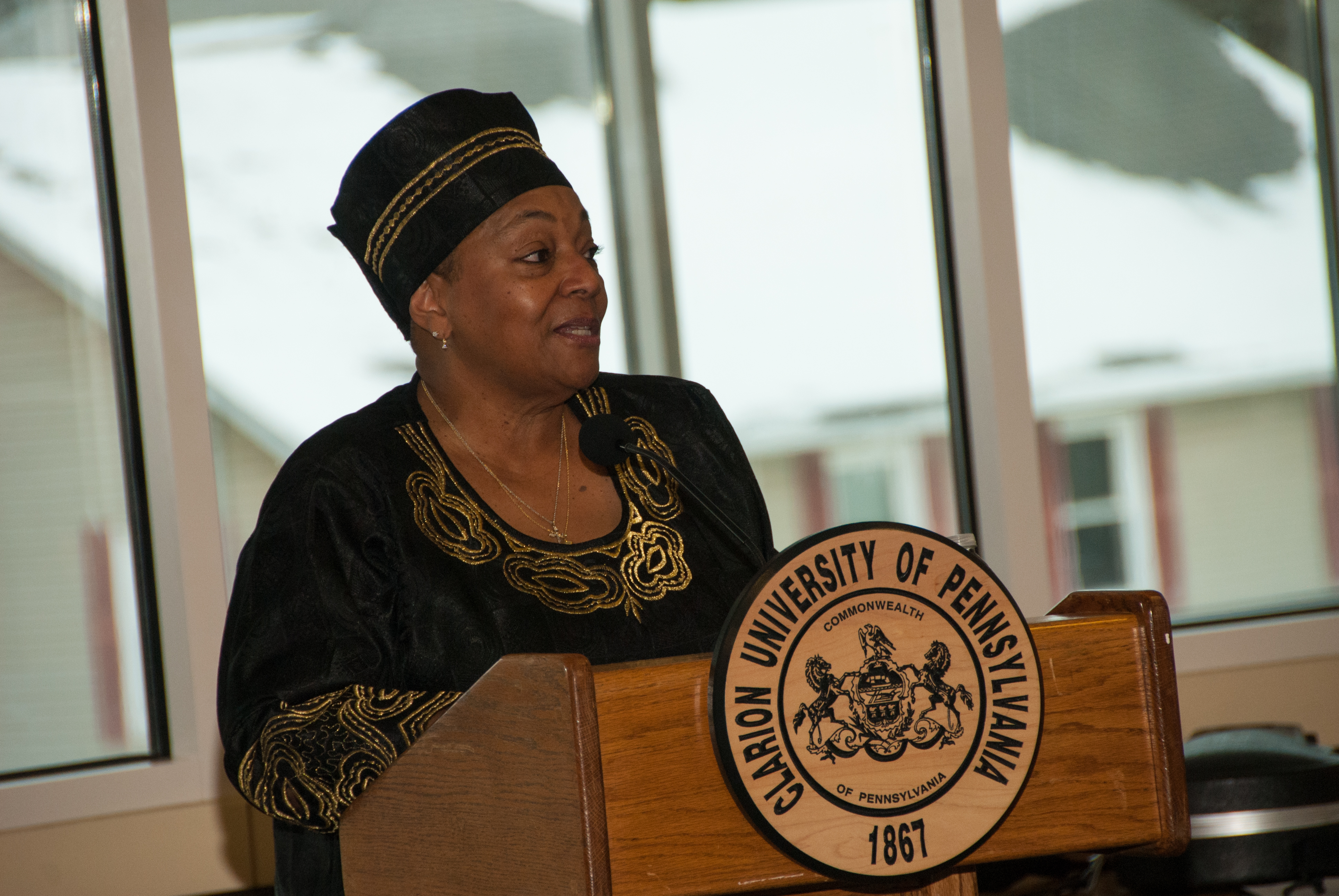|
It wasn’t long after Dr. Brenda Sanders Dede began working in Clarion that she was driving home and noticed she was being followed. With every turn she took, the vehicle behind her took the same turn. It was a local police officer. Eventually, he turned in a different direction.
The next morning she called the pastor of First Baptist Church, which she had begun to attend, and she called Clarion University's first Black dean, John Shropshire, who worked to promote ethnic tolerance in the community.
By the end of the day, the police chief called Dede and apologized to her.
"When he asked the officer why he followed me, the officer said I fit the profile of a young, Black male. Once he ran the plates and they came back that I was female, he stopped following me," Dede said.
It's not unusual for people to be a bit nervous when they notice a police car behind
them; no one enjoys being pulled over. Dede, however, was afraid for her safety. Not
because she was doing anything wrong, but because she is Black.
It was the late 1990s.
Around the same time, a friend invited Dede to work with her in the library during
the Knox Ladies' Seminar.
"I went to eat lunch, and a little old lady walked up to me and said, 'Hello. How
are you? What do you do for us? Clean our bathrooms?'"
If not for Shropshire, Dede might have decided that predominantly white Clarion wasn't
a place she wanted to be.
He introduced her to the Pennsylvania Black Council on Higher Education, introduced
her around town, helped her get involved in politics, the borough and Kiwanis.
"I came here from an HBCU. I had all Black schools, all Black everything. I would have people tell me my degree from an HBCU was not up to par with a university like Temple, but it was," Dede said. "John helped me understand it's not about the degree or the school, it's about the person and how you apply your education."
The way in which Dede applied her education was to help people. She had decided that
long before coming to Clarion.
"My first degree was sociology," Dede said. "I wanted to change how Black people lived
and help people who were marginalized."
Her own life was first.
Dede grew up in Houston's Fifth Ward, a poor, Black neighborhood where young girls were "supposed to get married and have babies, not necessarily in that order." Neither her grandparents nor parents went to college.
She earned her degree through a weekend college program at Texas Southern University. During that time she worked as a clerk typist in the dean of students office. She finished her first degree at age 27, then continued through master's and doctorate programs. She knew that education would allow her to have a say in what happened to her in her life and career.
An ad in The Chronicle of Higher Education brought Dede to Clarion University. She was in her 40s and her children were grown. She accepted a position as director of faculty research and development. With Shropshire as mentor, she immediately became a member of the Pennsylvania Council for Blacks in Higher Education.
"I found myself seeing the needs of students, and I started working with them. It helped me in my daily job; it helped me help the faculty," she said.
As much as John Shropshire was "Poppa Shrop," Dede gave the students the motherly love – often tough love – that many lacked.
She recalls working with a student who eventually revealed that she had been adjudicated to Shuman Juvenile Detention Center in Pittsburgh.
"What does that have to do with you being at Clarion?" Dede asked. "She had nothing to build on. She had been in foster homes, in Shuman, everywhere."
Dede and Shropshire were a key part of keeping her at Clarion for four years. She graduated, got her degree and moved to the eastern part of the state to work with youth.
A freshman basketball recruit's introduction to Dede was the demand, "Where you going in those pajamas? You go back to your room and put on some clothes." Dede also challenged her when she conducted herself in a way that was unacceptable. That same young woman had nowhere to go after commencement when her mother told her she wasn't welcome back home. Dede took her in. Why?
"Because she needed me."
Clarion University and the Clarion community need Dede, too. What does she see as her contributions?
"The university wouldn't have the Martin Luther King breakfast, Juneteenth and the NAACP chapter. And they wouldn't have some of the common knowledge as related to minorities, race and equality."
Dede is a charter member of the American Association of Blacks in Higher Education. She has served the Pennsylvania Black Conference on Higher Education in multiple capacities, including president and historian. Her recognitions include Clarion Chamber of Business and Industry Citizen of the Year, Pennsylvania Black Conference on Higher Education Presidential Award, National Resource Center and Cengage Learning's Outstanding First-Year Student Advocate, and PASSHE Frederick Douglass Institute Support and Encouragement award.
Dede retired from Clarion University in 2018 after serving as associate vice president for academic affairs for the previous six years. She remains active in the Clarion community, including as an elected member of Clarion Borough Council since 2010.
